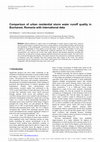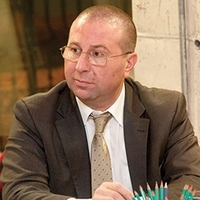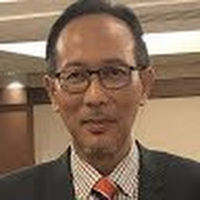Papers by Gabriel Racovițeanu

E3S Web of Conferences, 2019
Diffuse pollution is a major source of contaminants to surface waters in urban areas. Land use ac... more Diffuse pollution is a major source of contaminants to surface waters in urban areas. Land use activities and the degree of imperviousness have a strong influence on the pollutant loadings and the pattern and distribution of the pollutograph. Uncontrolled discharges of contaminated urban storm water runoff contribute to impairments of water quality in receiving waters. In this study, grab samples of storm water runoff were collected from a small high-density residential catchment area in Bucharest. The pollutant concentrations were analysed for several water quality physical and chemical parameters including pH, conductivity, oil and grease, nutrients, pathogen indicator bacteria and some heavy metals. The storm events were monitored through grab sampling. The sample results for this representative residential catchment area in Bucharest were then compared with data reported from other regions of the world. The analysis demonstrates that the characteristics of the urban runoff quality from residential areas in Bucharest were comparable with data obtained from other areas in the world.
Regional Forum Danube - Eastern Europe - Efficient Use and Management of Water 2018 Conference, 2018
Several constituents discharged with urban storm water runoff have been sampled and analyzed in a... more Several constituents discharged with urban storm water runoff have been sampled and analyzed in a residential area in Bucharest, Romania. A total of five rainfall-runoff events were monitored through grab sampling. The monitored parameters included conventional measurements, such as pH, conductivity, oil and grease, but also heavy metals, nutrients and pathogens. The analysis shows that urban storm water runoff washes of certain pollutants in concentrations above the numerical water quality standards. The attempt to determine the existence of a first flush phenomenon proved inconclusive.
International Conference Sustainable Solutions in Water Management 2017 - Conference Proceedings, 2017
The dramatic impacts of the climate change phenomenon faced by the urban communities coupled with... more The dramatic impacts of the climate change phenomenon faced by the urban communities coupled with increased urbanization trend dictate a new paradigm in managing urban storm water runoff in the wider context of Integrated Urban Water Management. To defend cities from the threat of flooding and to protect the quality of receiving waters, nature-based solutions, such as Low Impact Development, Green Infrastructure, Natural Water Retention Measures, etc., must be part of the toolbox of practices.
The creation of dedicated centers for studies, research, and specialists training, to support the implementation of these techniques, appear to be a positive approach for countries attempting to initiate the change to the new paradigm.
– The rise in population moving to urban centers and the land development to support this growth ... more – The rise in population moving to urban centers and the land development to support this growth creates additional stress on natural resources, including the aquatic ones. In many countries that have made significant strides in addressing the point source pollution through massive investments in sewer collection systems and wastewater treatment plants, the quality of the receiving waters still shows signs of impairment due to diffuse pollution. In order to address these remaining challenges, especially in controlling the quality of urban storm water runoff, new approaches, closer to natural systems, are implemented. These new approaches and techniques include Low Impact Development, Green Infrastructure, Sustainable Urban Drainage Systems and Smart Growth, among others.




Uploads
Papers by Gabriel Racovițeanu
The creation of dedicated centers for studies, research, and specialists training, to support the implementation of these techniques, appear to be a positive approach for countries attempting to initiate the change to the new paradigm.
The creation of dedicated centers for studies, research, and specialists training, to support the implementation of these techniques, appear to be a positive approach for countries attempting to initiate the change to the new paradigm.